 Several readers have inquired after details of Michael
Davies’ funeral, which took place on Friday, October 22,
at St. Mary’s Church on Crown Lane in Chislehust, Kent,
about a half an hour by train outside London. Several readers have inquired after details of Michael
Davies’ funeral, which took place on Friday, October 22,
at St. Mary’s Church on Crown Lane in Chislehust, Kent,
about a half an hour by train outside London.
Imagine,
if you will, the most picturesque, country
church—something you may have seen on a postcard or in
an old movie—complete with thick stone walls, stained
glass, a little steeple and a churchyard dotted with
headstones of Catholics laid to rest there over the
recent centuries. Imagine further that this church is
nestled in a quaint village with tree-lined lanes and
flower gardens, far removed from the hustle and bustle
of noisy London. Imagine all this and you’ve got an idea
of the final resting place of Michael Davies.
This is
particularly poignant, I think, to those who knew well
his yen for country living and his oft-stated regret
that his work kept him in London, far removed from his
beloved Wales and quite distant from the simple, rural
life he’d dreamt of since having left it as a boy. It
pleased his friends a great deal to see that, in death
at least, Michael’s wish for a return to the country had
been granted. The charming village, the gentle breezes
rustling the treetops, the rolling fields nearby—all of
it seemed to quietly attest to the fact that Michael
Davies had found a fitting place to rest.
In many ways, his Requiem Mass was like he
was—anything but ostentatious, gentle and ever so
genuine. Consider the scene as I saw it: The old church
is filled to capacity, as are the sanctuary with priests
and the vestibule with friends obliged to stand for lack
of room in the overcrowded pews. At the front, his
patient widow, in black veil and mourning dress, leans
upon the beloved daughter and two sons she’d given her
faithful husband. And there in the center of the modest
sanctuary is a simple wooden coffin, appointed with
flowers and a silver crucifix.
At first I could hardly bring myself to look at it,
scarcely able to make my mind accept the reality that in
that box lay the body of my old friend. It was so hard
to believe that the he was there, lying silently before
us. But, of course, he wasn’t there at all. His soul had
shuffled off that mortal coil, which awaited Christian
burial there in the churchyard just outside.
As the Requiem progressed, it occurred to me that,
wherever he was, Michael must have been gratified to see
that his family and friends didn’t overdo his funeral.
Indeed, those in attendance witnessed a funeral
befitting a dignified Catholic gentleman. The ancient
Requiem was sung by friends (not professionals) and,
yet, it was one of the most moving I’d ever heard. The
historic Catholic Mass was celebrated with all the
solemn dignity that Michael cherished. It, too, was not
overdone. It was prayerful, reverent, Catholic!
The celebrant, Fr. Martin Edwards of St. Mary
Magdalene’s in East Hill, Wandsworth, had been (I later
learned) one of Michael’s students many years ago, a
fact that showed in everything the good priest did and
said. Father’s manifest reverence for the Mass and
flawless celebration of the Requiem were impressive
beyond words.
And when, after Mass had ended, Father delivered a
eulogy in honor of his old teacher, I doubt very much
that there could have been a dry eye in the place. He
spoke at length of the teacher, the father, the husband,
the friend, the scholar, and the devoted son of the
Church who’d dared, out of love, to stand and resist
those who attacked her from within.
He recounted humorous anecdotes, as well, including
one that recalled Michael entertaining a group of
seminarians in his home some years ago. He’d given each
a glass of whiskey and then played the film,
The Magnificent Seven,
for them. The punch line came when Father Edwards
recounted how Michael pointed to the hero in the film
(played by Yul Brynner) and said in his inimitable
accent: “There, now doesn’t he remind you of Archbishop
Lefebvre?”
The priestly tribute paid to Michael Davies that day
by his student turned traditionalist priest was as
unforgettable as it was accurate and from the heart. And
the pleasant fact that it was delivered in that slightly
elevated manner of expression that is the English way
only added so much more to the moment.
Shortly thereafter, as the
In Paradisum
was solemnly chanted, I looked on as my old friend’s
coffin was carried out of the church and into the
adjoining churchyard. The finality of death was
beginning to set in. After having walked so many miles
with him on pilgrimage, this would be the last walk we’d
take with him.
But, as if Heaven wished to console us, what do you
suppose happened next? Yes, the clouds parted and
brilliant sunshine quite suddenly bathed the scene even
in the shadows of the stone church. I’m not much for
“signs and wonders,” but perhaps it wouldn’t be so out
of the question for Heaven to have smiled down on a
favored son just as he was being laid to rest. It
certainly seemed that way.
Solemnly, the casket was lowered into the ground.
Tears were shed, prayers were said and, exactly as
Michael would have wanted, the small men’s schola now
bid him one final adieu by singing a Welsh anthem over
the body of the fallen Welshman. Indeed, it was a poetic
moment!
Whoever arranged Michael Davies’ funeral (and I
suspect it was mostly the work of his longsuffering
wife, Marija) certainly gave every possible
consideration to the personality and temperament of the
man, and tailored it accordingly. Down to the last
detail, the service at Chislehurst could not have been
improved upon. While leading all present in solemn
prayer for his soul, the ceremony also honored Michael
Davies just as he’d lived—simply and truly.
As my American companions (Chris Ferrara and Gerry
Matatics) and I dropped some bits of earth into the hole
where Michael’s body now rests, it struck me that this
had not been the terribly sad event I had dreaded on the
plane overseas. A Catholic had died after faithfully
serving his God, his Church and his family all the days
of his adult life. What could be sad about that!
Fittingly, his Requiem had been offered according to the
ancient Rite he’d spent a lifetime defending. Even more
fittingly, it had been celebrated by one of the little
students now grown into manhood who’d learned from him
and who’d heard the calling to the holy priesthood soon
thereafter.
And there’s more. Just two weeks before he’d passed,
an American priest friend had unexpectedly stopped in to
see Michael at his home in London. For reasons only God
knows, this priest insisted to a then-recovering Michael
Davies that he should receive the Last Rites. Michael
agreed, and took the Sacrament of Extreme Unction there
in his home at the hand of his old friend. The rest is,
as they say, history.
Michael Davies died suddenly of heart failure less
than two weeks later, believing to the end that death by
cancer was still a year off. Clearly, the Almighty takes
care of His own.
While considering all this there in the churchyard at
St. Mary’s, there just didn’t seem to be any reason to
weep. Life was simply marching on as it always does,
only stopping for a moment to acknowledge the passing of
a fallen son. Sooner or later, we’re all meant to
follow, and our prayer can only be that we’ll accept it
as blithely as did he.
A short while after the coffin had been lowered into
the ground, a distinguished (and very English) funeral
director in black tails announced that Michael’s family
was inviting the entire company to a nearby public house
called Papa Charlie’s, where lunch was to be served and
all would raise a glass in memory of the deceased. Papa
Charlie’s? Again, it couldn’t have been scripted any
better. Way to go, Michael!
Indeed, glasses were raised that day, as happy
memories were recalled and stories recounted at that
delightful pub in Chislehurst. Michael may have
physically left us but his memory still remained. He’d
died and now been buried, but on that day his friends
and family made an implicit pact that he will not soon
be forgotten, at least not by those who knew him, loved
him and were inspired by him.
As that unexpected ray of sunshine pierced the overcast
skies that day outside the stone church of St. Mary’s, I
wondered how many Masses had already been offered for
the repose of the soul of Michael Davies. Perhaps the
sun’s light gave some hint that all is well and that the
gentle soul has already passed through the gates of
Paradise; but, then again, perhaps not.
In the event that more prayer is needed to release
his soul from purgatory, I repeat my plea from our
October 15th issue and ask all to take it to heart: Any
one who is fortunate enough to be worshipping regularly
at the Tridentine Mass these days may see fit to
consider that, were it not for the work of Michael
Davies, there may not be many such Masses left for any
Catholic to attend anywhere in the world.
Would it not be right, then, for each of us to vow
here and now to have one such Mass offered for the
repose of his soul? I can think of no more fitting way
to repay the debt we owe the man who spent thirty-five
years teaching us all about the “most beautiful thing
this side of heaven”.
 |
EULOGIES IN MEMORY OF MICHAEL |
|

Michael's Requiem Mass
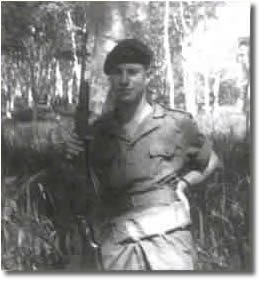
Michael as a young soldier
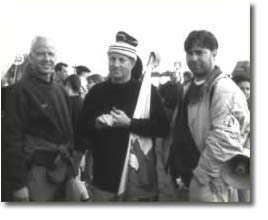 Michael on Pilgrimage
Michael on Pilgrimage
to Chartres
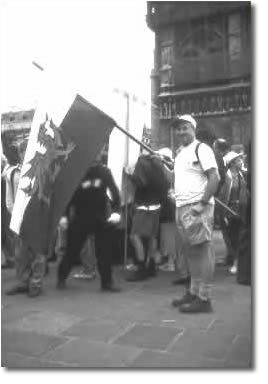
Some years later carrying the Welsh flag on pilgrimage to
Chartres
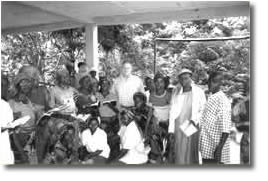
Michael in Nigeria
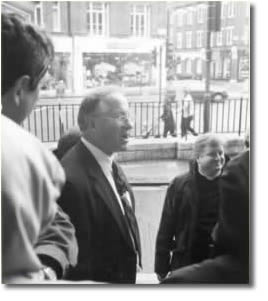
Michael in London
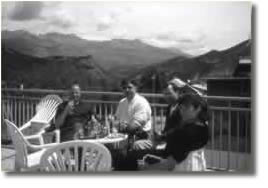
At Notre Dame de Laus,
French Alps, 1995

Michael lecturing at the Chapel of
the Vendee, 1994

With Walter Matt on the occasion
Walter Matt's 50th Anniversary
as an Editor

Michael with Walter Matt on the
30th Anniversary of The Remnant
|
